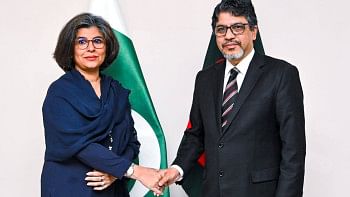Bangladesh not ready for nuke plant
German Ambassador to Bangladesh Albrecht Conze yesterday expressed his reservations on setting up nuclear power plants in Bangladesh, saying that the country is too populated and runs risks of earthquakes that may lead to a nuclear disaster.
“I don't think nuclear energy is a solution in Bangladesh…we must learn from the Fukushima disaster of Japan...Very thorough examination should be there on nuclear plant in Bangladesh,” he said.
On March 11, 2011, an earthquake and tsunami knocked out cooling systems for the reactors at the Fukushima nuclear plant, leading to meltdowns at three of them. Bangladesh is building a 2,000 megawatt nuclear plant in Pabna with Russian assistance.
The ambassador was addressing as chief guest the launching of a book, “Climate Change and Bangladesh”, in the capital's Cirdap.
The book, containing 14 articles of noted environmental experts and journalists, was published by the Centre for Development Communication (CDC) and edited by CDC Executive Director Muhammad Jahangir.
The German diplomat was also critical of coal-fired power stations which emit huge amounts of carbon. He blamed weak regulations for the excess amounts of carbon traditional brick kilns emit and for the pollution of rivers with industrial waste.
Clean energy must be promoted to prevent climate change and prevent the massive health expenses Bangladeshis incur, he said.
He suggested focusing on alternative and renewable energy sources and pointed at Bhutan, Nepal and the Maldives which were harnessing hydroelectricity.
Bangladesh also has large untapped onshore and offshore gas reserves that need to be explored, he said, emphasising on eco-friendly solar energy, of which Germany is an advocate.
Nearly 25 percent of Germany's electricity production comes from renewable energy.
He admitted that developed countries were mainly responsible for climate change but stated that developing countries like Bangladesh cannot just ignore their own responsibilities.
Journalist Mahfuzullah said while Bangladesh was a major victim of climate change, the fund meant for mitigation or adaptation to climate change was not being utilised efficiently while there were allegations of irregularities.
Dr Khaleq-uz-zaman, senior adviser for the Sustainable Energy for Development project of GIZ, a German development agency, said they were promoting a cooking stove in rural Bangladesh which can reduce fuel use by at least 50 percent and help prevent respiratory diseases like asthma.
Bangladesh Environmental Journalists Forum Chairman Quamrul Islam Chowdhury and Institute of Environment and Development Executive Director Numan Ahmed Khan spoke at the programme, moderated by Muhammad Jahangir.

 For all latest news, follow The Daily Star's Google News channel.
For all latest news, follow The Daily Star's Google News channel. 



Comments